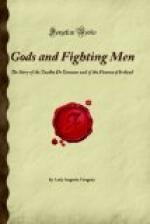Then the armies set out in their ships, and they were not gone far when the wind rose and the waves, and they could hear nothing but the wild playing of the sea-women, and the screams of frightened birds, and the breaking of ropes and of sails. But after a while, when the wind found no weakness in the heroes, it rose from them and went up into its own high place. And then the sea grew quiet and the waves grew tame and the harbours friendly, and they stopped for a while at an island that was called the Green Rock. But the King of the World said then: “It is not a harbour like this you promised me, Glas, son of Dremen, but a shore of white sand where my armies could have their fairs and their gatherings the time they would not be fighting.” “I know a harbour of that sort in the west of Ireland,” said Glas, “the Harbour of the White Strand in Corca Duibhne.” So they went into their ships again, and went on over the sea towards Ireland.
CHAPTER II. CAEL AND CREDHE
Now as to Finn, when it was shown to him that the enemies of Ireland were coming, he called together the seven battalions of the Fianna. And the place where they gathered was on the hill that was called Fionntulach, the White Hill, in Munster. They often stopped on that hill for a while, and spear-shafts with spells on them were brought to them there, and they had every sort of thing for food, beautiful blackberries, haws of the hawthorn, nuts of the hazels of Cenntire, tender twigs of the bramble bush, sprigs of wholesome gentian, watercress at the beginning of summer. And there would be brought to their cooking-pots birds out of the oak-woods, and squirrels from Berramain, and speckled eggs from the cliffs, and salmon out of Luimnech, and eels of the Sionnan, and woodcocks of Fidhrinne, and otters from the hidden places of the Doile, and fish from the coasts of Buie and Beare, and dulse from the bays of Cleire.
And as they were going to set out southwards, they saw one of their young men, Gael, grandson of Nemhnain, coming towards them. “Where are you come from, Cael?” Finn asked him. “From Brugh na Boinne,” said he. “What were you asking there?” said Finn. “I was asking to speak with Muirenn, daughter of Derg, that was my own nurse,” said he. “For what cause?” said Finn. “It was about a high marriage and a woman of the Sidhe that was showed to me in a dream; Credhe it was I saw, daughter of the King of Ciarraighe Luachra.” “Do you know this, Cael,” said Finn, “that she is the greatest deceiver of all the women of Ireland; and there is hardly a precious thing in Ireland but she has coaxed it away to her own great dun.” “Do you know what she asks of every man that comes asking for her?” said Cael. “I know it,” said Finn; “she will let no one come unless he is able to make a poem setting out the report of her bowls and her horns and her cups, her grand vessels and all her palaces.” “I have all that ready,” said Cael; “it was given to me by my nurse, Muirenn, daughter of Derg.”




